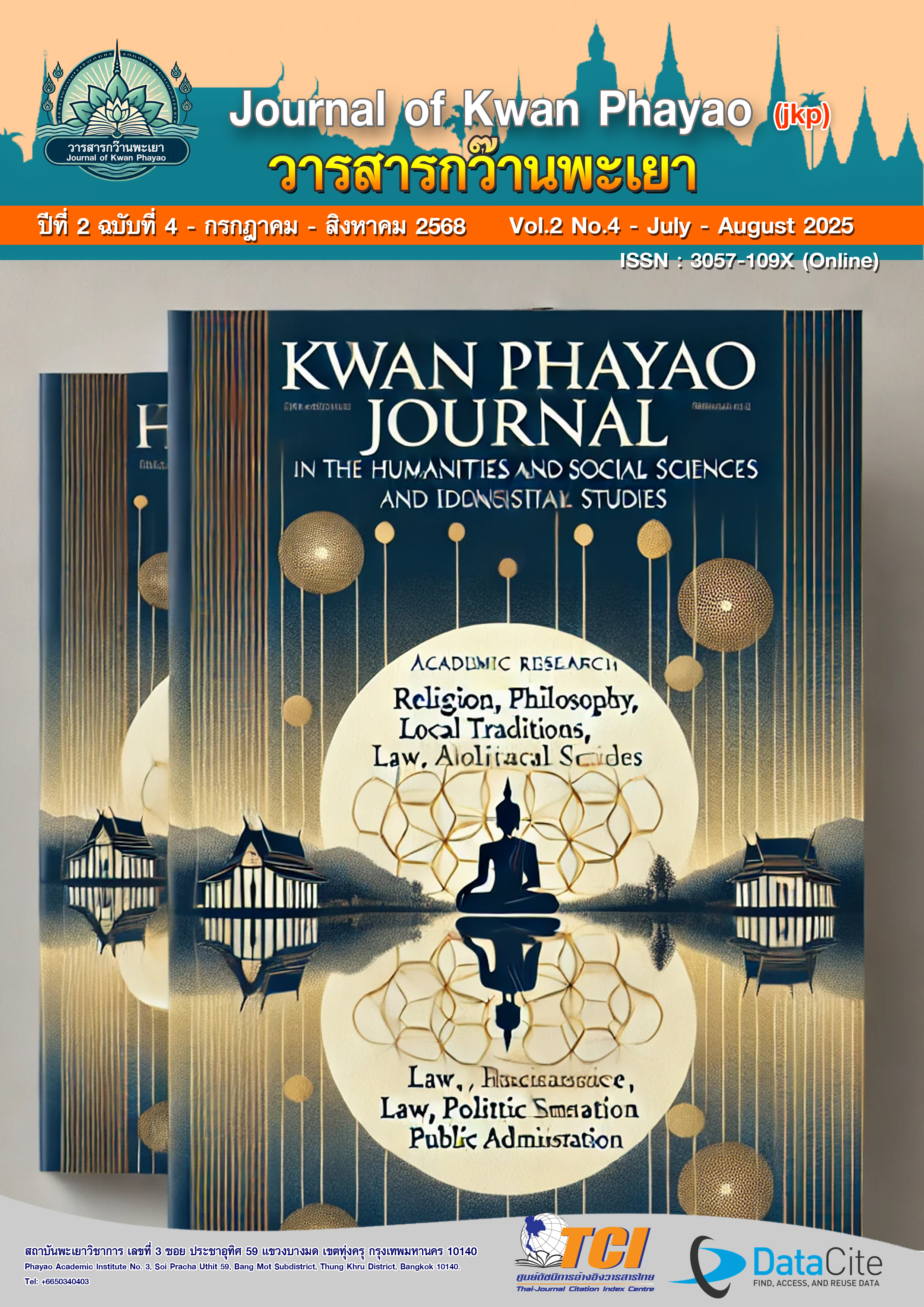THE POWER OF SOCIAL NETWORKS IN POLITICAL PARTICIPATION IN CONTEMPORARY THAI SOCIETY
Keywords:
Social media, Political participation, Networked citizenship, Digital democracy, ThailandAbstract
This article analyzes the role and power of social media networks in shaping political participation in contemporary Thai society, employing the theoretical frameworks of political participation, Habermas’ public sphere, and new media and digital democracy. The findings indicate that social media has significantly transformed Thailand’s political landscape from offline to digital participation, enabling citizens—particularly youth and students—to play a more active role through platforms such as Twitter and Facebook. Political hashtag activism, exemplified by #เยาวชนปลดแอก (#FreeYouth) and #saveบางกลอย (#SaveBangKloi), not only amplified domestic issues but also connected them to international political discourse. The emergence of “networked citizenship” further illustrates how digital citizens generate new political narratives and set public agendas, thereby fostering participatory democracy in Thailand. Nevertheless, challenges remain, including misinformation, fake news, social polarization, and state-imposed restrictions, which continue to limit the full development of digital democracy in the Thai context.
References
Aim, S. (2020). Hashtag activism and youth movement in Thailand. Journal of Social Issues in Southeast Asia, 35(2), 145–167.
Bennett, W. L., & Segerberg, A. (2012). The logic of connective action: Digital media and the personalization of contentious politics. Information, Communication & Society, 15(5), 739–768.
Boulianne, S. (2015). Social media use and participation: A meta-analysis of current research. Information, Communication & Society, 18(5), 524–538.
Castells, M. (2012). Networks of outrage and hope: Social movements in the Internet age. Polity.
Chadwick, A. (2017). The hybrid media system: Politics and power (2nd ed.). Oxford University Press.
Chaiyan, R. (2021). Political communication in Thailand’s digital age. Asian Journal of Communication, 31(4), 312–329.
Coleman, S., & Blumler, J. G. (2009). The Internet and democratic citizenship: Theory, practice and policy. Cambridge University Press.
Dahlgren, P. (2009). Media and political engagement: Citizens, communication, and democracy. Cambridge University Press.
Gillespie, T. (2018). Custodians of the Internet: Platforms, content moderation, and the hidden decisions that shape social media. Yale University Press.
Habermas, J. (1989). The structural transformation of the public sphere: An inquiry into a category of bourgeois society. MIT Press.
Held, D. (2006). Models of democracy (3rd ed.). Stanford University Press.
Howard, P. N., & Hussain, M. M. (2013). Democracy’s fourth wave? Digital media and the Arab Spring. Oxford University Press.
Human Rights Watch. (2021). Thailand: Cybersecurity law endangers rights. Retrieved from https://www.hrw.org/
Kaewthep, K. (2020). Youth movements and online political communities in Thailand. Journal of Communication and Society, 18(2), 55–77.
Kaplan, A. M., & Haenlein, M. (2010). Users of the world, unite! The challenges and opportunities of social media. Business Horizons, 53(1), 59–68.
Kuner, C. (2017). The General Data Protection Regulation: A commentary. Oxford University Press.
Lee, F. L. F., & Ting, H. (2015). Media and protest logics in the digital era: The Umbrella Movement in Hong Kong. Chinese Journal of Communication, 8(4), 353–375.
Livingstone, S. (2004). Media literacy and the challenge of new information and communication technologies. Communication Review, 7(1), 3–14.
McCargo, D. (2019). Thai politics: Between democracy and its discontents. NIAS Press.
McCargo, D. (2020). Future forward: The rise and fall of a Thai political party. NIAS Press.
McNair, B. (2018). An introduction to political communication (6th ed.). Routledge.
Sinpeng, A. (2021). Digital media, political authoritarianism, and Internet controls in Southeast Asia. Democratization, 28(1), 1–19.
Sinpeng, A., & Sullivan, J. (2020). Social media and political participation in Thailand. In Digital Asia (pp. 115–133). Routledge.
Sirivunnabood, P. (2020). Cyber politics in Thailand: The role of information operations. ISEAS Perspective, 45, 1–12.
Sunstein, C. R. (2018). #Republic: Divided democracy in the age of social media. Princeton University Press.
Suwannakij, P. (2021). Digital citizenship and youth politics in Thailand. Journal of Contemporary Asia, 51(5), 789–808.
Tucker, J. A., Theocharis, Y., Roberts, M. E., & Barberá, P. (2017). From liberation to turmoil: Social media and democracy. Journal of Democracy, 28(4), 46–59.
Verba, S., Schlozman, K. L., & Brady, H. E. (1995). Voice and equality: Civic voluntarism in American politics. Harvard University Press.
Yang, G. (2016). Narrative agency in hashtag activism: The case of #BlackLivesMatter. Media and Communication, 4(4), 13–17.




